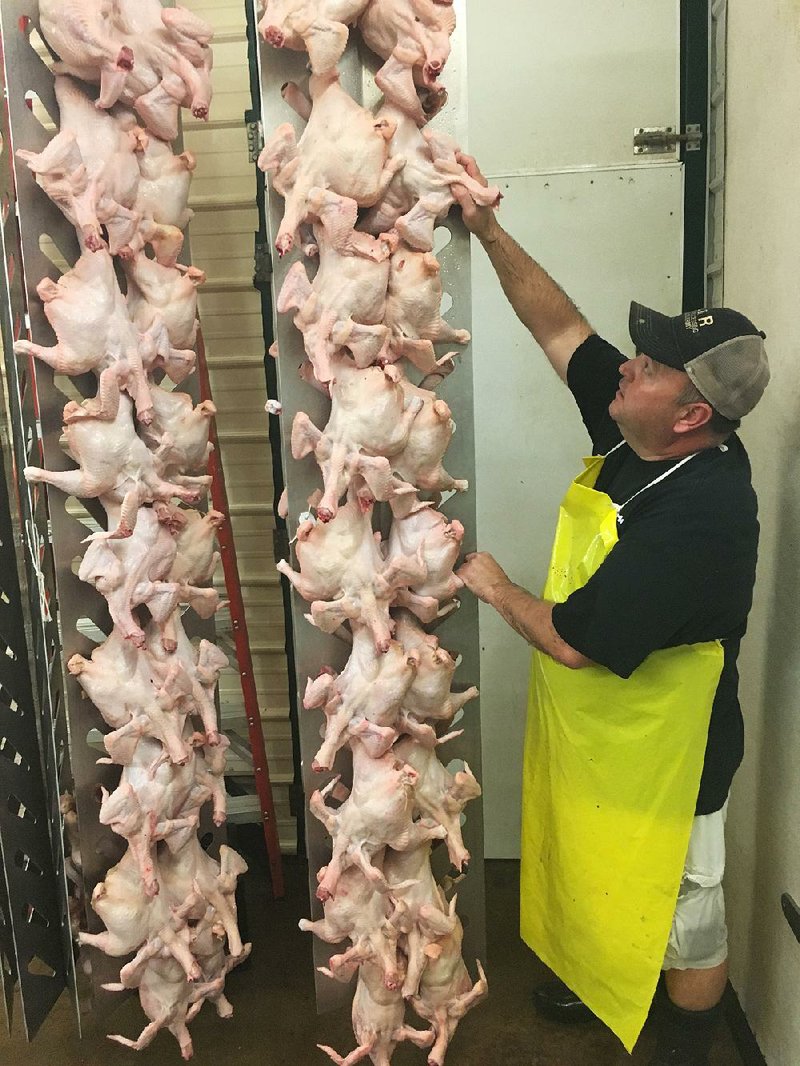WINSLOW -- Scott Ridenoure, part owner of B&R Processing and Taxidermy in Winslow, opened the small slaughterhouse just before deer season in 2013.
The plan was to prepare the game harvested by family and friends.
"We opened not knowing if we were going to have customers or not," Ridenoure said.
Four years later the small business has more work than it can handle -- processing everything from pork and beef to sheep and the occasional bear. With help from a nearby poultry grower, Ridenoure expanded the shop last month to include poultry processing in his tan and green shed.
B&R is now one of only three federally-inspected processors in Arkansas for small-scale independent poultry growers. This allows small Arkansas growers to legally sell their products across state lines. More than half of the inspected processors in the state are owned by large food companies and are mainly used for their own products.
"A processor like this is an anomaly," said poultry grower Terrell Spencer. "Normally, there's zero."
Spencer, owner and operator of Across the Creek Farm, said he first grew interested in farming while in Iraq more than 10 years ago. At quiet times during his yearlong combat tour, he'd watch farmers work, Spencer said.
Spencer returned to Fayetteville in 2005 with a newfound interest. He studied environmental soil and water sciences at the University of Arkansas and shortly after began an operation with two dozen laying hens. It has since grown to an annual 10,000 to 12,000 broiler chicken farm.
In the hills near West Fork, Spencer and his farmers move broiler-filled floorless coops daily so the chickens can scratch on fresh pasture. Spencer said he does this to maintain the health of his birds and the soil.
The use of natural feed grains that have not been genetically modified and a more natural environment for the birds has caught the attention of chefs and health enthusiasts in Northwest Arkansas.
However, strong local demand hasn't solved all of Spencer's problems.
He ran into a commuting issue, moving broilers from farm and processor to distributors. For years, he made multiple 40-mile treks every week from West Fork to the closest chicken processor in Van Buren -- Garner Abattoir & Meat Processing -- and on to restaurants in Fayetteville and Bentonville. A significant amount of Spencer's income was being funneled into travel and third-party processing expenses.
Through the grapevine, Spencer heard that a processor nearby was gaining momentum. He was soon working with B&R.
At 8 a.m. on Mondays, roughly 600 live chickens in 75 crates are lined up at the meat processor door. Once inside, the chickens are slaughtered, prepared and air-chilled before being packaged on Tuesdays and ready for pick-up by Wednesday for restaurants, retailers and farmers.
"No one looks forward to chicken day," Spencer said jokingly, wiping sweat off his brow inside the hot box filled with slaughtering equipment.
Inside a 75-square-foot space, eight workers are stationed on the poultry line, including a U.S. Department of Agriculture inspector, plus Ridenoure and Spencer who handle the flow of chickens. By 2 p.m., they've processed all the birds; a feat that takes large chicken processors minutes to complete.
According to a 2014 USDA article, large poultry plants process about 140 chickens per minute, with assistance from automation and long assembly lines.
While B&R's process isn't as large or efficient, Spencer said, he has more control over his products, he has cut down on commuting and processing costs, and he's within 10 miles of his farm.
"Now we can offer customers a product that never leaves the county," Spencer said.
Another benefit is the air-chill cooler B&R uses for chicken, beef and pork. It's a slower method compared to water-chilling, but there's a noticeable flavor difference, Spencer said.
Matt McClure, executive chef at The Hive in the 21c Museum Hotel in Bentonville, has noticed a difference in Spencer's final product. McClure said there's improved skin texture, the feathers are fully removed, and the necks are attached, which make for better reduction sauces.
"The overall quality has improved drastically," he said.
The chicken line addition is also good news for independent chicken growers in and around the state. As acting board president of the American Pastured Poultry Producers Association, Spencer had enough connections to supply B&R with chicken orders for the rest of the year, Ridenoure said.
"It's crazy what happens when neighbors work together," Spencer said. "He opened the plant at first so they'd have a place to process their own stuff, and that was my same thinking. It makes sense that everything would just line up."
Every Monday a different poultry grower is scheduled to bring their flocks to B&R, along with Spencer's.
Last week, Damon Helton of The Farm at Barefoot Bend near Benton, took his first batch of chickens to Winslow. Helton and his wife, Jana, also raise cows and swine, which they've processed at B&R since about January, he said.
"To have a small processor ... really helps out," Helton said. "If I'm going up there to pick up chickens, I'll drop off my pork and beef."
Even though it's a three-hour drive to Winslow, there are no feasible processor options near his farm, Helton said.
Farmers can rent out nearby slaughterhouses and processing facilities owned by large food companies. The problem is most small farmers are turned down because they don't have enough poultry to supply a Tyson or Simmons Foods plant, Helton said.
"You're looking into the tens of thousands [of chickens]," he said. "You can't hate on them for it, but it limits the whole local food movement."
A month in, Ridenoure and Spencer are getting their footing, but conversations about expanding have begun. Last week, Ridenoure ordered six more hanging racks for the cooler to keep up with orders.
A farmer couldn't walk in right now and schedule a slaughter, Ridenoure said.
"We're booked 'til Christmas."
SundayMonday Business on 09/03/2017

